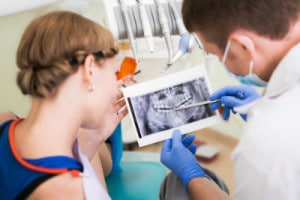
Less Pain
Dental lasers are considerably more comfortable than traditional surgical treatments. This can be welcome information to patients who are fearful of dental anesthesia for certain procedures. By eliminating the need for anesthesia, your recovery time is much quicker and there is considerably less pain.
Reduced Bleeding
Before lasers, certain dental procedures involved a lot of bleeding. Dental lasers significantly reduce bleeding because the high powered light that is used actually helps coagulate open blood vessels, healing wounds faster and speeding up your recovery time.
Versatility
A wide range of hard and soft tissue procedures can benefit from laser dentistry. These procedures range from decay removal and cavity preparation to root canals and gum and bone surgical procedures.
Improved Precision
Laser dentistry makes it possible to treat decay or cavities in hard to reach areas without affecting the surrounding tissue. When using a laser, the accuracy of treatment is improved, and more of your healthy tooth structure remains intact. With better precision comes an increase in dental health into the future.
Less Risk of Infection
The high energy beams from a dental laser not only heal open wounds, they also sterilize the area the laser is working on to protect against bacteria that causes areas of bleeding and infected gums. In this way, laser dentistry is especially helpful for patients with gum disease, as they can use this treatment at every appointment.
Discover how laser dentistry can benefit you! Contact Dr. Stanley Hirst, DDS, and Bethany Jensen, DDS, at Broadway Family Dentistry today by calling (701) 839-1299 to schedule a check-up.



